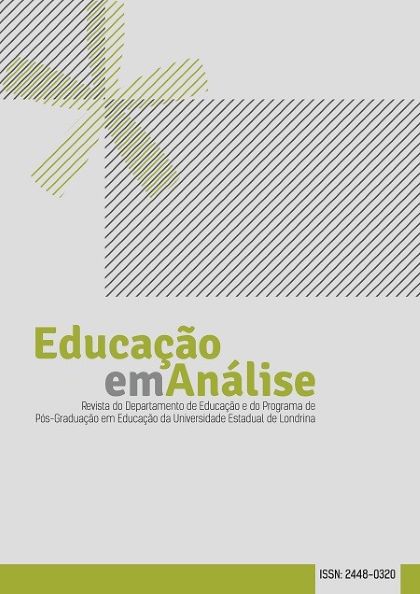The sense of belonging at school: signification produced by junior high school students
DOI:
https://doi.org/10.5433/1984-7939.2018v3n1p133Keywords:
Human Development, School Education, Education Context Social Interaction.Abstract
Based on the Bioecological Perspective of Human Development (Urie Bronfenbrenner 1917-2005), this descriptive study was carried out to analyze the sense of belonging to school, assigned by Junior High School students (from 6th to 9th grades, from 11 to 15 years old). This qualitative approach study used the following research devices: semi-structured interviews and production of pictorial representations with captions. Its results comprise three categories: 1) The school as a space for sheltering (11 participants) or as aversiveness (8 participants); 2) Relationship with other students: belongingness (14 participants) or exclusion (5 participants); 3) Relationship with teachers: friendly affinity (13 participants) or difficult relationship (6 participants). Considering that the events experienced in school are integrated into the other microsystems of student development, by contextually produced processes, the sense of belonging to school and the meanings developed by it affect her/him far beyond the school context. Therefore, one noticed the school as a microsystem capable of producing a set of meanings which links the sense of belonging to school and to scientific knowledge. Understanding in an integrated way the various elements which compose the school microsystem helps working up the educational practices and policies meant for facing unfavorable situations by means of learning and stimulates positive meanings about school.Downloads
References
BERGER, Peter L.; LUCKMANN, Thomas. A construção social da realidade. Petrópolis: Vozes, 1985.
BHERING, Eliana; SARKIS, Alessandra. Modelo bioecológico do desenvolvimento de Bronfenbrenner: implicações para as pesquisas na área da Educação Infantil. Horizontes, Bragança Paulista, v. 27, n. 2, p. 7-20, jul/dez, 2009.
BRONFENBRENNER, Urie; CECI, Stephen J. Nature-nurture reconceptualized in developmental perspective: a biological model. Psychological Review, New York, n. 101, p. 568-586, 1994.
BRONFENBRENNER, Urie. A ecologia do desenvolvimento humano: experimentos naturais e planejados. Porto Alegre: Artes Médicas, 1996.
BRONFENBRENNER, Urie. Making human beings human: bioecological perspectives on human development. California: Sage Publications, 2005.
BRONFENBRENNER, Urie. The bioecological model of human development. In: DAMON, William; LERNER, Richard M. (Ed.). Handbook of child psychology: theoretical models of human development. New York: John Wiley, 2006. p. 993-1028.
CECCONELLO, Alessandra Marques; KOLLER, Silvia Helena. Inserção ecológica na comunidade: uma proposta metodológica para o estudo de famílias em situação de risco. In: KOLLER, Silvia Helena. (Org.). Ecologia do Desenvolvimento Humano: pesquisa e intervenção no Brasil. São Paulo: Casa do Psicólogo, 2004. p. 267-292.
COPETTI, Fernando; KREBS, Ruy Jornada. As propriedades da pessoa na perspective do paradigma bioecológico. In: KOLLER, Silvia Helena (Org.). Ecologia do Desenvolvimento Humano: pesquisa e intervenção no Brasil. São Paulo: Casa do Psicólogo, 2004. p. 67- 89.
ERICKSON, Frederick. Conceptions of school culture: an overview. Educational Administration Quarterly, Columbus, v. 23, n. 4, p. 11-24, nov. 1987.
LISBOA, Carolina; KOLLER, Silvia Helena. O microssistema escolar e os processos proximais: exemplos de investigações científicas e intervenções práticas. In: KOLLER, Silvia Helena (Org.). Ecologia do desenvolvimento humano: pesquisa e intervenção no Brasil. São Paulo: Casa do Psicólogo, 2004. p. 337-354.
MATTOS, Sandra Maria Nascimento de. O desenvolvimento do raciocínio lógicomatemático: possíveis articulações afetivas. Caderno Dá Licença, Niterói, v. 7, p. 105- 122, 2008.
NARVAZ, Martha Giudice; KOLLER, Silvia Helena. O modelo bioecológico do desenvolvimento humano. In: KOLLER, Sílvia Helena (Org.). Ecologia do desenvolvimento humano: pesquisa e intervenção no Brasil. São Paulo: Casa do Psicólogo. 2004. p. 51 a 65.
OSTERMAN, Karen F. Students' need for belonging in the school community. Review of Educational Research, Washington, v. 70, n. 3, p. 323-367, 2000.
PRATI, Laíssa Eschiletti et al. Revisando a inserção ecológica: uma proposta de sistematização. Psicologia: Reflexão e Crítica, Porto Alegre, v. 21, n. 1, p. 160-169, 2008.
POLONIA, A. C.; DESSEN, Maria Auxiliadora; SILVA, Nara Liana Pereira. O modelo bioecológico de Bronfenbrenner: contribuições para o desenvolvimento humano. In: DESSEN, M. A.; COSTA JUNIOR, A. L. (Org.). A ciência do desenvolvimento humano: tendências atuais e perspectivas futuras. Porto Alegre: Artmed, 2005. p. 71-79.
TUDGE, Jonathan; GRAY, Jacquelyn T.; HOGAN, Diane M. Ecological perspectives in human development: a comparison of Gibson and Bronfenbrenner. In: TUDGE, Jonathan; SHANAHAN, Michael J.; VALSINER, Jaan (Org.). Comparisons in human development: understanding time and context. New York: Cambridge University Press, 1997. p. 72-105.
YUNES, Maria Angela Mattar; MIRANDA, Angela Torma; CUELLO, Sandra Eliane Sena. Um olhar ecológico para os riscos e as oportunidades de desenvolvimento de crianças e adolescentes institucionalizados. In: KOLLER, S. H. (Org.). Ecologia do desenvolvimento humano. São Paulo: Casa do Psicólogo, 2004. p. 197-218.
YUNES, Maria Angela Mattar; JULIANO, Maria Cristina. A Bioecologia do desenvolvimento humano e suas interfaces com educação ambiental. Cadernos de Educação, Pelotas, n. 37, p. 347-379, set./dez. 2010.
YUVAL-DAVIS, Nira. Belonging and the politics of belonging. Patterns of Prejudice, London, v. 40, n. 3, p. 197-214. 2006.
Downloads
Published
How to Cite
Issue
Section
License
The journal reserves the right to make normative, orthographic and grammatical changes in the originals, with the aim of maintaining the cultured standard of the language and the credibility of the vehicle. It will, however, respect the authors' writing style. Alterations, corrections, or suggestions of a conceptual nature will be sent to the authors when necessary. In these cases, the articles, after being adequate, should be submitted to a new appreciation.









